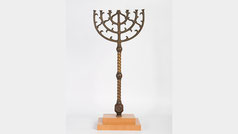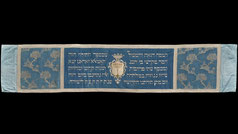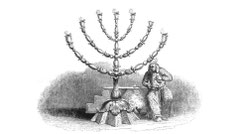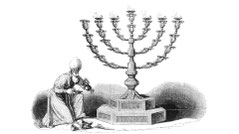ANCIENT AND NEW MENORAHS - 19th Century
This website shows historic menorahs from the nineteenth century. Menorah illustrations from other centuries: Ancient Menorahs until the 1st century, 2nd century, 3rd century, 4th century, 5th century, 6th-10th century, 11th-13th century, 14th century, 15th century, 16th century, 17th century, 18th century, 20th century, 21st century. Coins and Medals

1800 (or 1799). The Angel Appearing to Zacharias by William Blake (1757–1827). Blake devoted much of the year 1799–1800 to fifty visionary scenes drawn from the Bible. This scene, the earliest in the NT narrative cycle, illustrates verses from Luke (1:11–13), in which Gabriel appears to the righteous Zacharias, a high priest of the Jewish Temple in Jerusalem, to announce that Zacharias’s elderly and barren wife will give birth to a son, Saint John the Baptist. Metmuseum. Source: Link1, Link2

1800. Golden Candlestick. The print is numbered: 35. It shows: several depictions of Menorah, including the Golden Lampstand of the Tabernacle. Engraving on a vellin type paper. This print originates from Calmet's 'Fragments of the Holy Scriptures', published in 1800. Engraver unknown. Engraved after the original by Calmet. Antoine Augustin Calmet (1672-1757), French Benedictine. Engravings in this work by A. de Putter, F. van Bleyswyk, M. Pool... Source: Link1, Link2

1800. Antique Engraving of an Ancient Bible Manuscript. Printed in France, circa 1800. Size: 21.5 X 13.5 inches approx. Engraving is Unframed. LiveAuctioneers. Source: Link

1800 and later. A Decorated Omer calendar, the scroll painted with Hebrew inscriptions within red and blue scroll cartouches, 3 membranes circa 1800, the remainder later, read through a window in a parchment surround painted with menorahs, crowns, and tablets of the law spaced with foliage, mounted on rollers within a glazed wood box height of case 10in. (25.4cm), width of scroll 3in. (7.8cm). Source: Link

c. 1800. A rare and important Silver Sheviti/Amulet. Ukraine. Simply chased in the shape of a Temple style menorah. Engraved with various prayers and quotations from scripture. Most significantly the top engraving Asks “OUR FATHER OUR KING HAVE PITY UPON US, OUR YOUNGSTERS AND OUR BABIES”. Most likely used in front of the cantor’s podium as he led the congregation. Holes from former mounting. Loss to corner and cracking. 11.5” tall x 8” wide. Source: Link1 Link2

c. 1800. A large Brass Hanukkah menorah. Dutch. On round base with eight outstretched arms. Topped by a lion finial. Size: 23" tall x 29" wide. Source: Link

1800. A bronze menorah-form hanukkah pricket lamp, probably from Germany. Strong square base and thick baluster stem with engine-turned bands, formed as a stylized tree with flower heads and leaves, iron prickets, has servant light. Size: height 19 1/2 in. 49.5cm. Sothebys. Source: Link

1800. A German silver-glit Torah shield. Columned niche form chased with a menorah on scalework ground, all topped by baldachin and crown with lion supports and 4 tassels, hung with three bells and chain, the bottom with 1930 commemorative inscription. Size: Height 13 3/4 in. 35cm. Franz Anton Gutwein, Augsburg. The inscription records the gift of this shield by Max Levi and and Carl Levi of Stuttgart and their family in memory of their parents, 1930. Sothebys. Source: Link

1800. A Polish parcel-gilt silver Hanukkah lamp. Arched backplate applied with a menorah flanked by lions and two birds, box-form rack of lamps above tall scroll and leaf feet, left-mounted candle sconce. Marked on backplate with maker's name and 12. Size: height 7 5/8 in. 19.3 cm. Josef F.K. Sothebys. Source: Link

19th century (early). Hanukkah Lamp. German Inscription translated: "Blessed are you, Eternal One, our God, King of the world, who sanctified us by His laws and commanded us to light the Chanukah". Exhibition: Judaism in the History of Silesia. Catalogue of the association "Jewish Museum Breslau". Printed 1929 in Breslau (Schlesien, Silesia). After the WW2 the German population was expelled and most of Silesia came to Poland. Breslau is now called Wroclaw. Source: Link

1803. Title: The Circumcision by P. Gally. The rabbi holding the infant Jesus in a shallow dish supported by a kneeling boy, while another man on the right circumcises Him; the Virgin standing on the right, St Joseph on the right, two other men and two boys holding lit candles; rows of columns to either side and the menorah in an arched niche in the background. Dimensions: Height: 353 mm, Width: 255 mm. The British Museum, number 2010,7081.659. Source: Link

1804. Antique objects: Jewish chandelier, vase, helmets... In: "Raccolta di Cento Tavole...", Table 37. Inscription: "Candelabro del Tempio di Gerosolima la base aggiuntavi dai Romani per il Trionfo di Tito, si vede nel medemo Arco." Dimensions plate: 267 x 399 mm. Publisher: Giacomo Raffaelli. © Hamburger Kunsthalle, Kupferstichkabinett, Germany. Source: Link

1806. Napoleon grants freedom to the Jews. Beautiful menorah illustration. Napoleon Bonaparte enacted laws that first emancipated Jews in France, establishing them as equal citizens to other Frenchmen. In countries that he conquered during the Napoleonic Wars, he emancipated the Jews. Source: Link, Link2

1806. Title: A Design for a branch light, proposed to be executed in silver. These candlesticks are reminiscent of the Menorah, but have only six lamps. Collection: Designs for ornamental plate, many of which have been executed in silver, from original drawings. Etchings. Origin: London. Author: Tatham, Charles Heathcote (1771-1842). Etcher: Cooper, George (fl. 1792-1830). Publisher: Printed for T. Gardiner, by J. Barfield. Digitalcollections. Source: Link1, Link2

1807. La Biblia Vulgata latina: traducida en español, y anotada conforme al sentido de los santos padres y expositores católicos. By Scio de San Miguel, Felipe (1738-1786). Latin and Spanish in parallel columns. Source: Link

19th century (early). Brass Menorah from Eastern Europe. © All rights reserved to The Hebrew University of Jerusalem. Source: Link

19th century. An Antique late 19th century Copper made Hanukkah Menorah. This Menorah is known as the Baal Shemtov Type and is a typical Polish Warsaw made. The base is made in press and bending technique and is attached to the back plate. The main Design and configuration motives including the candle cups and upper cups and the 10 Commandments and lion are later added and attached to the main structure. Source: Link

1810 (Hebrew year 5570). Hanukkah lamp with a depiction of the prophet Zechariah's vision. Rome, Italy. This is not the seven-armed biblical menorah with 22 almond blossoms. Hanukkah is a Jewish holiday commemorating the rededication of the Holy Temple (the Second Temple) in Jerusalem at the time of the Maccabean Revolt against the Seleucid Empire. Hanukkah is observed for eight nights and days. H: 64; W: 44 cm. Israel Museum Jerusalem. Source: Link

19th-20th century. Silver Hanukkah Lamp. Place Made: United States (USA). Dimensions: 12 × 9 3/16 × 1 15/16 in. (30.5 × 23.4 × 5 cm). The Jewish Museum, New York. Source: Link

19th century. This travelling menorah was used by Jews who had to travel on Chanuka. Silver, hallmarked 12. Central Europe. The menorah is divided into eight compartments that serve as beakers with holes for wicks on their sides. With a matching shamash that can be hung over the side of the menorah. The backplate is decorated with a relief of a menorah shaped like a tree, which is also attached with hinges and serves as a cover for the case. Winners-Auctions No 083. Source: Link

1810. Keter, Corona, Torah finials. Turin, Italy. The 7-branched Menorah has 3 round knops, alluding to the knops and the flowers of the Menorah are at the junction between the shaft and branches. Each branch ends with three small bowls, one above the other, terminating with flames. Source: Link

19th century (first half). Torah crown with menorah. Galicia, Kiev, Ukraine. Photo: Radovan, Zev. Center for Jewish Art. Source: Link

19th century. Box for the Torah in the form of a cylinder, which opens in the central area to keep the scroll of the Law. Completely decorated by vases with bouquets of flowers. In this truncated cone or funnel appears a "menorah" flanked by two stars of David inscribed in circles and two large vases with flowers, in addition to the two holes for the guides of the Torah scroll. Height = 86.70 cm; Width = 39.80 cm. Museo Sefardi in Toledo, Spain. Source: Link
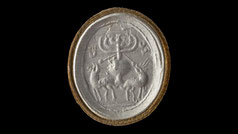
19th century. Greek vase with lotus plant and special menorah form. Description: The lotus plant rises from the vase with three distinct branches. It has been postulated that the shape is reminiscent of a menorah, specifically the menorah from the temple of Jerusalem. The vase is flanked by two indistinguishable animals. This image has been selected and made available by a user using Artstor's software tools. Cornell University Library. Source: Link

1810. Italian miniature hanging sabbath lamp, vincenzo parenti [1767-1819], Rome, the 8 spouted lamp flat chased with a serpent, a menorah and star, punctuated by flower heads, the lower body chased with stiff leaves repeated on the canopy, struck with the following marks on body and canopy: maker's mark, city mark and two control marks in use under French occupation- RCA [Bulgari No. 163] in use in 1815 and TE in monogram crowned use for large work 1811-14. height: 27.4 cm. Link

1810. Metz, France. "Armor, cult and objects of use of the Hebrews", colored and wide-etched copper engraving approx. 19x26cm on handmade paper (ca. 23x34cm) and with the corresponding, printed (title) büttenen "silk shirt" (German: Seidenhemdchen). Nr. 3: "Chandelier de Hebreux." Source: Link

1815. Sacrilege of Antiochus. Series: Macklin's Bible. During a battle Antiochus carries a large stolen menorah and an embroidered altar cloth over his shoulder to right (1st Book of Maccabees 1:21-24). Etching and engraving. Print made by: William Bromley. Published by: Cadell & Davies. Dimensions: Height: 480 mm, Width: 340 mm. The British Museum, number 1871,0513.25. Source: Link

19th century. The Triumph of Titus and Vespasian. Engraving (Jules Romain) of the original colored painting from 1537 by artist: Giulio Romano (1499–1546). Sheet size: 155x250 mm, internal dimension: 110x150 mm c.a. Source: Link

19th century. Title: Procession to the Ark. ‘Preparation of a Hebraic feast’. Creator: Luigi Ademollo (1764-1849). Carved marble frame bas-relief interior temple menorah candelabrum; candlestick columns ceiling curtains red gold Jewish people Jews procession loaves Ark of the Covenant. Location: Palazzo Pitti, Florence, Tuscany, Italy. Mondadori Portfolio/Electa/Nicola Grifoni, Bridgeman Images. Source: Link1 Link2
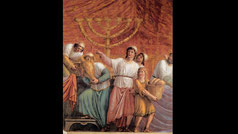
1816. Procession to the Ark, The Menorah, by Luigi Ademollo. The same picture as above but with changed perspective. Fresco. Galleria Palatina (Palazzo Pitti), Florence. Luigi Ademollo (April 30, 1764 – February 11, 1849) was an Italian painter. He was born in Milan. He studied at the Brera Academy, where he was taught by Giulio Traballesi, Giocondo Albertolli, and Giuseppe Piermarini. He left Milan in 1783 and traveled and worked in Rome and Florence. Source: Link

1816. Description: The infant Joash swearing an oath on the Torah, six men surrounding him, a menorah in the background; after Chaudet; illustration to 'Athalie', Act IV scene III; illustration to the second edition of 'Oeuvres complètes de Jean Racine'. Etching. After: Antoine Denis Chaudet. Published by: Pierre Didot in Paris. Print made by: Philippus Velyn. Dimensions: Height: 220 mm, Width: 135 mm. The British Museum, number 1900,1231.636. Source: Link

1817. Italian School Bible, Title: "Biblia per la gioventu o sia compendio della storia dell'antico e nuovo testamenta" by Luigi Rossi; L.R., Milano. Österreichische Nationalbibliothek, Shelfmark: 212342-B.1 ALT MAG. Source: Link

1817-20. Period coloured copper etching by Giovanni Bigatti (1774-1817), published in Ferrario "Il costume antico e moderno" (The ancient and modern costume). 15.5 x 21.5 cm. Ferrario III 104. N° 12. Depiction of three archpriests in diverse costumes with seven-branched candelabrum (menorah) and a golden altar of incense. Title: "Sacerdoti benedicono Mosè" (priests bless Moses). Source: Link1, Link2
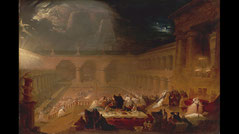
1821. Belshazzar's Feast is an oil painting by British painter John Martin (1789–1854). It was so popular that it needed to be protected from the crowds by a railing, and established Martin's fame. The Biblical episode depicted in the painting - Belshazzar's Feast - is described in the Book of Daniel. The Babylonian king Belshazzar is said to have defiled the sacred vessels of the enslaved Israelites by using them to serve wine at a banquet. The Menorah is on the right side of the painting. Source: Link

1823. Fo'a Yeshiva in Vercelli, a city in Piedmont, Italy. Vault with menorah, north side. Photograph Copyright: Center for Jewish Art. Source: Link
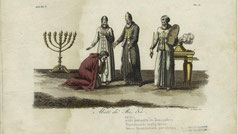
1823-1838. Title: Abiti De' Re &C. Engraver: Sasso, Giovanni Antonio. Dimensions: 15x24 cm. (5 3/4 x 9 1/4 in.). Mid-Manhattan Picture Collection. The New York Public Library. Source: Link

1826-1875. Old chandelier in the Dome to Brunswick (Alter Leuchter im Dome zu Braunschweig) by C. Moritz (painter). Dimensions: height x width: 247 x 173 mm (sheet). The original candlestick can be found on the 12th century website. © Herzog August Bibliothek Wolfenbüttel, Germany. Source: Link

1827. Title: "La sacra scrittura illustrata con monumenti fenico-assirj ed egiziani da Michelangelo Lanci fanese, interprete delle lingue orientali nella Biblioteca Vaticana..." Author: Michele Angelo Lanci. Printed in Rome by Societa Tipografica. Biblioteca Digital Hispánica, U/759. Source: Link1, Link2, Link3, Link4

1832. Spanish Catholic Bible translated by Félix Torres Amat. Title: "La Sagrada Biblia nuevamente traducida de la vulgata latina al español: aclarado el sentido de algunos lugares con la luz que dan los textos originales hebreo y griego, é ilustrada con varias notas sacadas de los santos padres y expositores sagrados". Printed in Madrid by Miguel de Burgos. Source: Link

1833-1836. Karl Bryullov. Title: "Sacco di Roma." 88x117,9 cm. Tretyakov Gallery, Moscow. Source: Link

1833. Sacra Bibbia di Vence : prima edizione italiana - opera dedicata a S. M. I. R. A. Francesco 1. Atlante contenente le carte geografiche ed iconografiche relative al testo ed alle dissertazioni. Drach, Paul-Louis-Bernard; A. R. Fremin (Maps by); Antonio Lanzani, Johann Jacob Falkeisen, Angelini (Engravings by). Published by Fortunato Stella e Figli, Milano, Italy. Source: Link

1836-1844. German Image Bible for the catholic church (Title: "Allgemeine, wohlfeile Bilder-Bibel für die Katholiken oder die ganze heilige Schrift des alten und neuen Testaments"; Leipzig: Baumgärtner). However, the evangelical Luther Bible (Title: "Allgemeine, wohlfeile Volks-Bilderbibel") uses exactly the same illustrations. BSB, B.g.cath. 351 d. Source: Link1, Link2, Link3, Link4, Link5

1836-1844. German Image Bible for the protestant church according to the translation of Martin Luther. Title: "Allgemeine, wohlfeile Volks-Bilderbibel, oder die ganze heilige Schrift des alten und neuen Testaments, nach der Übersetzung Martin Luther's." Leipzig, Publisher: Baumgärtner. Augsburg, Staats- und Stadtbibliothek; Th B VII 129 und BSB B.g.luth. 208 o. Source: Link1, Link2, Link3, Link4, Link5

1837. Tevah in the Synagogue in Bayonne (St. Esprit), Aquitaine, France. Photograph Copyright: Vladimir Levin. The Center for Jewish Art. Source: Link

1838. The candlestick of gold. The seven-armed candlestick menorah (according Exodus 25). Steel engraving, old coloured, by Jacques Louis Constant Le Cerf after drawing by Lanvin. In: Abbé Martin, Histoire de la Terre-Sainte depuis les temps les plus reculés jusqu’en 1838, Paris (P.Duménil) 1838, Table 7. AK-Images. Source: Link

1840. Italian carved giltwood standing menorah, carved with acanthus and centered by an openwork anthemion, vase-form sconces rising from leaves to metal drip pans and sconces, rectangular base incised with lozenge-work. Size: height 55 in. 150 cm. Sothebys. Source: Link

1841. German book about the Tabernacle by Ferdinand Friederich. Title: "Symbolik der mosaischen Stiftshütte: eine Vertheidigung Dr. Luther's gegen Dr. Bähr; mit 23 Tafeln." The first picture is very interesting. It shows that the author was not sure where the almond blossoms are located on the tribe of the Menorah. The second Menorah is from the Arch of Titus in Rome. Printed in Leipzig. Bayerische Staatsbibliothek München (Germany), Shelfmark: Exeg. 388 u. Source: Link
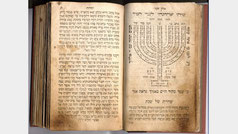
1842. Book title: Séder tefilah mikol ha-shaná. Description Book of prayers for schoolchildren with which the annual cycle of Jewish festivities can be followed. It is written in Hebrew except the first introductory chapter in Ladino. Elaborated according to the Sephardic rite. Author: Ben Chaim, R. Yisrael (Editor of the first part); Pardo, R. David (Editor of the second part); both edited in Belgrade. Museo Sefardi in Toledo, Spain; Inventory 1061/001. Source: Link

1843. Title: Mikhtam ʿoni ha-yamin by Abel Elias Abel. Content: A work for the propagation of Christianity among the Jews. Author: Abel Elias Abel. Decoration: Golden letters and a golden crown (f. 2r). A drawing of a menorah in a separate piece of paper, which was then glued onto f. 2r. British Library, Or 9053. Source: Link

1844. 'Vision du Propete Zacharie" (The vision of the Prophet Zechariah). This plate shows Jewish candlesticks. Old antique print originates from: "Atlas Geographique et Iconographique du cours complet d'ecriture Sainte...", published by M.L. Migne, Paris, France. Source: Link

1844. Title: "Chandelier d' Or." From: 'Atlas Geographique et Iconographique du cours complet d'ecriture Sainte, Gravé par vingt Artistes distingués de Paris, sous la direction de Theophile Blanchard et Barrere Freres', published by M.L. Migne, Paris. (transl.: Geographical and Iconographical atlas after the lectures of the holy scripture). Source: Link

1845-1861. Design for the restorations and paintings in Brunswick (Braunschweig) Cathedral Germany: "The 12-year-old Jesus in the temple" (German: "Der 12-jährige Jesus im Tempel“). Draftsman: Heinrich Brandes. Technique: Wiped charcoal and chalk and brushed, squaring with pencil and charcoal, framing with pencil (Color representation see below: 1855). Institution: Herzog Anton Ulrich-Museum, Germany. Source: Link

19th-20th century. Amulet handwritten in black ink on parchment. The text is distributed forming a seven-branched candelabrum or "menorah". It also presents inscriptions distributed on both sides of said "menorah" and a text that frames the whole (part of it in white ink). The image of the chandelier is shown with remains of polychromy: foot with scrolls in yellow and pink; shaft and arms alternating yellow and white. Place of Origin: Tetouan (Morocco, Africa). Museum Sefardi Spain. Link

1846-1847, 1936 (interior). Tribes symbols in the Great Synagogue in Bucharest (Bucureşti,11 Vasile Adamache St.), Romania. Photograph Copyright: Center for Jewish Art. Source: Link

19th century (mid). Judaica, a continental silver amulet, probably central European. Probably intended to be hung on the wall of a house, the centre with a 7-branch candelabrum, 'menorah', inscribed along its branches and columns in Hebrew with Talmudic phrases, with additional phrases around the border, two eagles above & another two below, the bottom (left corner) bearing owner's name in Hebrew, 'Moshe ben Leeb'. 6in. (15.5cm.) high; 4in. (10cm.) wide. 4.5 oz. Christie's, Sale 5347. Link

1849. The holy place by Augustus Kollner (1813-1906, lithographer) and H. Camp (1822-1881, printer). At center, a priest putting incense into a censer on "The Altar of Incense", a large portable stand with carrying rods on two sides; a small censer sits on the floor nearby. On the left is "The Golden Candlestick" and on the right is "The Table of Shewbread". A large curtain hangs in the background. Library of Congress. Source: Link1, Link2

19th century. Title: The Erection of the Tabernacle by the Children of Israel in the Wilderness (engraving). Creator: English School. Medium: engraving. Bridgeman Images. Image number: XJF115873. Source: Link

1850. Chanukah lamp of cast brass from the second half of the 19th century. This nine-armed candlestick is 1.16 meters high and is probably intended for use in the synagogue. The shape of this lamp is inspired by Exodus 25: 31-40, in which the seven-armed candlestick in the Tabernacle is described with flower baskets and blossom on the shaft and arms. Source: Link

Mid 19th century. An Italian large Gold amulet of cartouche form, embossed with emblems including priest's hat, Tablets of the Law, censer and menorah on matted ground within scrollwork border, centered by armorial plaque below coronet, ribbon-bow finial. Unmarked. Size: height 5 1/8 in. 13 cm. Sothebys. Source: Link

1851. Wrought Copper Washing Pitcher Netilat (for ritual washing in Judaism). With double handle, decorated with fine engraving of two deer flanking a menorah. The base repossed with a fish in the typical manner. Inscribed and dated Hebrew 1851. Height: 15 cm; diameter: 18 cm. Literature: For a similar example of a fish reposee: "Masterpieces of Jewish Art - Bronze", A., Kantsedias, Image Pubshling, Moscow. LiveAuctioneers, Lot 25375. Source: Link

1851. "The Holy Vessels and Furniture of the Tabernacle" by Henry W. Soltau (1805-1875). He was born in Plymouth, England, and was educated at Trinity College, Cambridge. He gave up his law practice to devote himself to the study of the Scriptures and the work of the Gospel. He is also the author of "The Tabernacle, the Priesthood, and the Offerings" (1875-1927, please see below). Kregel Publications. Source: Link1, Link2, Link3, Link4
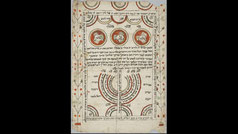
1851. A charm for a newborn baby boy. The motive for writing the charm with Bible verses is to protect the baby from evil spirits during his first eight days, until the circumcision ceremony. The round Menorah illustrated with the words of Ps. 67; and the star of David which includes inside some Kabbalistic words. Source: Link

1851-1854. Course of sacred archeology. Title: Cours d'archéologie sacrée: à l'usage des séminaires et de MM. les curés / par M. l'abbé Godard,..." Author: Leon Godard (1825-1863). Publisher: Guyot frères (Paris). Language: French. Bibliothèque nationale de France, département Littérature et art, V-40398. Source: Link

1852. Priest, Levite, and furnishings of the Tabernacle with a seven armed menorah. Image: Figures by Edvard Gover. And: The new biblical atlas, and scripture gazetteer: with descriptive notices of the tabernacle and the temple. Author: Edward Gover. London, Religious Tract Soc. Bib: Bayerische Staatsbibliothek, Signature: 2157303 Hbks/E 34 nb. Source: Link1, Link2, Link3

1855-1911. Hanukkah Lamp. Place Made: Probably Lubycza Królewska or Potylicz, Eastern Galicia (Poland or Ukraine). Medium: Faience: painted. Dimensions: 7 3/8 × 10 1/4 × 2 1/2 in. (18.7 × 26 × 6.4 cm). The Jewish Museum. Source: Link

1855-1861. Design for the new murals in the northern transept of the Brunswick (Braunschweig) Cathedral: "Rest on the Flight to Egypt, The twelve-year-old Jesus in the Temple and The Adoration of the Magi". Painter: Heinrich Brandes. Herzog Anton Ulrich-Museum, Germany. Source: Link

1857. Design drawing for stained glass memorial window showing kneeling young man, menorah, and Ten Commandments with text "Samuel, Samuel: Speak, Lord For Thy Servant Heareth". Contributor Names: J. & R. Lamb Studios, designer. Stained glass, single-light medallion, watercolors. Library of Congress. Source: Link

1859. Steel engraving (German: Stahlstich) drawn by Lanvin, engraved by Lecerf. Priest and seven-armed candelabrum Menorah. 23.0 x 14.0 cm. Galerie Napoleon. Source: Link

1859. Title: "Le chandelier d'or" (The golden candlestick). Steel engraving ca. 15,5 x 9,5 cm (representation / image size) on paper (22x14cm) below the illustration typographically titled and inscribed and the name of the artists: drawn by Lanvin, engraved by Lecerf. "Paris, Imp. de Legay, r. de la Bucherie,1". Lebigre-Duquesne. Source: Link

1860. Title: An allegory of the Old Testament: The seven archangels worship the seven-armed candelabrum. (German Title: Allegorie des Alten Testaments: Die sieben Erzengel verehren den siebenarmigen Leuchter Menora). In the foreground Gabriel and Michael. Artist: Carl von Blaas (Austrian, 1815–1894). Medium: pencil on paper. Size: 28 x 38 cm. (11 x 15 in.). Artnet. Source: Link1, Link2

1860. Annunciation of the birth of John by Heinemann, Joseph 1825–1901, Germany. Title: “Verkündigung der Geburt des Johannes”. From: Bilder-Bibel. Vierzig kolorierte Darstellungen (…) von J.Heinemann, Freiburg i. Br. (Herdersche Verlagshandlung) 1906, T.XIII. Berlin, Sammlung Archiv für Kunst und Geschichte. Source: Link

1861-1880. The History of Costume by Braun & Schneider. Jewish high priest wearing a hoshen, and Levites in ancient Judah. The "History of Costume" or "Zur Geschichte der Kostüme" was printed from 1861 to 1880 in Munich. It was originally published as individual plates in a German magazine titled "Münchener Bilderbogen". Later, these plates were collected and bound into book form. An excellent source for students who are studying the history of fashion and for costume designers. Link1, Link2

1861. White Carrara marble sculpture of Hannah and Samuel by Andrei. Depicting Hannah with draping robes holding Samuel in her left arm and placing a donation in a trunk with an engraved Menorah to its front, signed 'F. Andrei. Inv. E. Scolp. Roma, Italy. Samuel later became a prophet and foretold the identity of the first two kings of Israel, Saul and David. Dimensions: Height 87 cm / 34.3 inches, Width 40 cm / 15.7 inches, Depth 28 cm / 11 inches. Source: Link

1861. German book about the Tabernacle by Wilhelm Neumann. Title: "Die Stiftshütte in Bild und Wort." Printed in Gotha. The author has tried to depict the 22 almond blossoms on the Menorah. Bayerische Staatsbibliothek München (Germany), Shelfmark: Exeg. 787 tb. Source: Link

1862. German book about the Tabernacle by Christoph Johannes Riggenbach. Title: "Die mosaische Stiftshütte." Printed in Basel. Bayerische Staatsbibliothek München (Germany), Shelfmark: 4 Exeg. 724 b. Source: Link
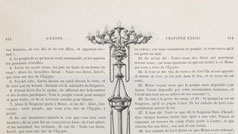
1866. The Holy Bible according to the Vulgate. New translation with the drawings of Gustave Doré. Language: French. Title: "La Sainte Bible selon la Vulgate. Traduction nouvelle avec les dessins de Gustave Doré. Tome 1". Translator: Pierre Janvier (1817-1888), Jean-Jacques Bourassé (1813-1872). Bibliothèque nationale de France, département Réserve des livres rares, SMITH LESOUEF R-6283. Source: Link

1866. 'Archeologia, Candelabro' (Archaeology, Candlesticks). From: 'Nuova Enciclopedia populare Italiana ovvero dizionario generale di scienze, lettere, arti, storia, geografia, ecc. ecc. ...', by Gerolamo Boccardio, Stefano Pagliani, published in Turin by Dalla Societa l'Unione Tipographico-Editrice. Source: Link

1867-72. Silver Hanukkah Lamp from Lemberg (Lviv, Ukraine). Several silver versions were made in the latter half of the 19th century in Lvov, as represented in the collection by this magnificent example. It appears to be a copy of a nearly identical lamp that stood in the Przedmiejskiey Synagogue in Lvov until 1939, and which is said to have been made in Breslau in 1775. At least two other copies of this Lvov lamp were made around 1870. The Jewish Museum NY. Source: Link1, Link2

19th century. German brass menorah. Size: H 25" W 22": Claw feet. Clasped hands clutch rotating arms. LiveAuctioneers, 2014 Lot 102333. Source: Link

19th century. Hanukkah Lamp. Place Made: Netherlands. Medium: Copper alloy: cast. Dimensions: 28 1/8 × 22 × 7 3/8 in. (71.5 × 55.9 × 18.7 cm). The Jewish Museum. Source: Link

19th century. A Polish large brass menorah, the openwork upper section centered with a plaque bearing Hebrew inscription, with eagle form finial, set on knopped stem and circular base applied with two lion masks. Size: Height 27 3/8 in. (69.5 cm). Source: Link

19th century. Hanukkah Menorah Silver Hallmarks: A.RIEDEL, O.C. 84 and double-headed eagle, Warsaw (Poland). Size: H: 73 cm, W: 49 cm, D: 24 cm (base). Crafted during the heyday of the silver production in Warsaw. Decorated with a chasing technique, motif of grapevine, leaves and grapes. Source: Link

Late 19th, early 20th century. A rare Middle Eastern made brass menorah lamp. The circular form often found especially in Iraqi Judaica. Dimensions: H: 7.3" (18.5 cm); Diameter: 3.5" (9 cm); Weight: 393 gram (13.9 oz). Source: Link

1867. Painting by Francesco Hayez (1791–1882), Italy. The destruction of the Temple of Jerusalem, detail ("La distruzione del Tempio di Gerusalemme; particolare"). Medium: oil on canvas. Galleria d'Arte Moderna, Venezia, Venice. The destruction took place in the year 70 AD at Tisha B'Av (9th Aw). Source: Link1, Link2

1869. German picture bible. This picture does not show a scene from the Old Testament, but announcing the birth of John by an angel (that is also what German text says below the picture: "Verkündigung der Geburt des Johannes"). Title: "Bilder-Bibel, vierzig Darstellungen der wichtigsten Begebenheiten des Alten und Neuen Testaments." Printed in Freiburg im Breisgau: (Herder). Universitäts-Bibliothek Eichstätt. Source: Link
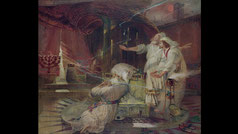
1869. The Rending of the Veil. Creator: Scott, William Bell (1811-90), Nationality: Scottish. Description: The subject is taken from Matthew 27:51 when the veil of the temple was torn in two at the moment of Christ's crucifixion. Medium: Watercolor heightened with bodycolor on paper. Dimensions: 61x76 cm. Photo © Peter Nahum at The Leicester Galleries, London; Bridgeman Images. Source: Link1, Link2

1869. Chief Rabbi ceremony in Synagogue at Rue Notre-Dame-de-Nazareth, Paris, France. This lamp does not have 7 but 8 high candles. Image from French Magazine, title: L'illustration: journal universel. v.53 1869. Babel-Hathitrust. Source: Link
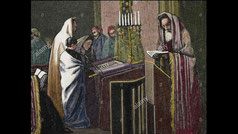
1870. Rabbi is reading in Torah at Synagogue. Engraving by Froment, published on La Illustracion, Spain. Alamy Stock Photo. Source: Link
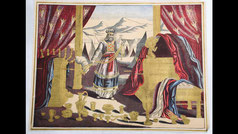
1872. Old Testament illustrated Bible, Judaica. High Priest inside the Tent of Meeting, Israelite encampment in the background. LiveAuctioneers. Source: Link

1872. Old Testament illustrated Bible, Judaica. View of High Priest inside the Holy of Holies. LiveAuctioneers. Source: Link

1873. The Tabernacle (Exodus 25) with important temple furnishings and menorah. It is from an illustration in Reverend John Brown's Illustrated Bible. Source: Link

1873. Menorah on the tomb for Rabbi Dr. Joseph von Maier (1799-1873) at the Jewish cemetery in Stuttgart, Germany. Source: Link

19th century. Three glass Kiddush cups, probably Bohemian. The first of buttressed and panel clear glass with gilt rim and gilt Yiddish inscription, engraved with a view of a synagogue, the second ruby glass engraved with landscape with running deer and inscribed for Passover, the third of ruby glass body engraved with a menorah within wreath and inscribed for the new year. Together with another paneled clear glass with later ruby glass inscription, 4 pieces. height 5 1/2 in. 14 cm. Source: Link

19th century (3rd quarter). Judaica, a continental parcel glit silver Torah shield. Mark of C. Roell, probably German. Escutcheon form, the top with flowers above an applied coronet, centre applied with a menorah above the twin tablets of the Ten Commandments on a diaperwork-engraved arched recess in turn above a rectangular aperture displaying the name of the relevant festival. Size: 15 in. (38 cm.) high, 49 oz. (1543 gm.). Christie's, Sale 9749, Lot 211. Source: Link
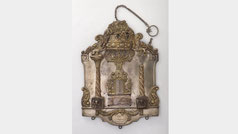
1873. Torah shield with dedicatory inscription, decorated with menorah, lions and crown. Germany. Silver, repoussé, engraved, cast, and partly gilt. Hebrew inscription: the Ten Commandments; German inscription: "Gift of A. Gundelfinger and M. Gundelfinger 1873". Dimensions: H: 33; W: 25 cm. Israel Museum, Jerusalem. Source: Link

1874. Hebrew-German Bible (OT). Title: "Die Heilige Schrift der Israeliten" (The Holy Scripture of the Israelits). Author: Philippson, Ludwig; Doré, Gustave. The menorah has a clear structure reminiscent of the 22 almond blossoms in Exodus 25. Bayerische Staatsbibliothek, Signature: 2 Th B VII 105 13254736. Source: Link1, Link2, Link3. Additional Info about the Gershom Scholem family Bible (originally belonging to the Hirsch family from East-Germany, Silesia; now Poland): Source: Link3

1874. Beautiful Bible with German and Hebrew text and many images (more than 700), also with many images of biblical plants. Leipzig, Germany. "Illustrierte Pracht Bibel für Israeliten in dem masoretischen Text und neuer deutscher Übersetzung mit erläuternden Anmerkungen von Julius Fürst: Mit... zus. ca 700 Bildern." Source: Link

1874. Title: "The Jewish tabernacle and priesthood" by George C. Needham. Image from page 18. Text appearing under image: "1. Brazen Altar. 2. Brazen Laver. 3. Table of Shewbread 4. Altar of Incense. 5. Golden Candlestick. 6. Ark and Mercy Seat. THE HOLY VESSELS." Language: English. Contributor: The Library of Congress. Source: Link

19th century (second half). A school plate in color with the image of the interior of the tabernacle, the tent sanctuary of the Israelits during the Exodus. One has a view of the first room of the temple "the holy place" in which there are a number of religious objects of gold: the seven-armed menorah, a showbread table and an incense altar (middle). 4 columns and a curtain separated the first room of the second room, "the holy of holies", where the "ark of the covenant" stands. Source: Link
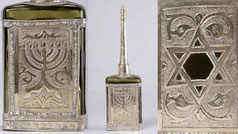
1876-1900. Bottle of perfume of the synagogue, with rectangular shape. Probably from a Sephardic community in Italy for the ceremony of "separation" or "habdalá" with which it ends on Saturday. Made in crystal melado and surrounded by a strip of silver engraved by a skillful artisan. On one side is a seven-branched candelabrum (menorah) and on the other a star of David, framed by plant motifs arranged symmetrically. Museo Sefardi, Toledo, Spain; Inventory No. 0914/001. Source: Link
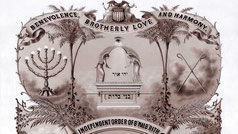
1876. The top part of the "B'nai B'rith membership certificate" shows a menorah and various masonic symbols. B'nai B'rith (translated "Children of the Covenant") was founded in New York and is the oldest Jewish service organization in the world. Source: Link

19th century. Title: Apron of a Master of the Order of the Rose-Croix (Tablier de Maitre). Masonic menorah on the right side above. Material: Leather. Creator: French School. Location: Musee Crozatier, Le Puy-en-Velay, France. Bridgeman Images. Image number XIR169562. Source: Link

1877. The angel of the Lord announced Zechariah the birth of John the Baptist (Luke, Chapter 1). Woodcut after a drawing by Julius Schnorr von Carolsfeld (German painter, 1794-1872) . Gettyimages. Source: Link

1878-1900. Blanc, Joseph (1846-1904). Histoire des Arts à travers les Âges. Partie de gauche: repères -84 à -72 : Antiquité grecque, Philosophes grecs, bouclier de Méduse, Antiquité juive, ménorah. Bibliothèque nationale de France. Gallica. Source: Link

1878. "Mizrah." "Biblisches Tableau" (Biblical Tableau). Made in Prague (Czech Republic) by Wolf Pascheles. Printed in the center are the words "Mizrah", "Mitzad Zeh Ruach Chaim" (from this direction comes the spirit of life), and "Shiviti Hashem Lenegdi Tamid" (I have set the Lord always before me). Surrounding the words are illustrations of Moses holding the Tablets of the Law and Aaron beside a menorah. Language: German). Approx. 38X45 cm. Kedem Auctions. Source: Link

1878. "Types and Shadows" or "The Tabernacle in the Wilderness:" "A Book for the Young" is a children’s book in ten chapters about the story of the Tabernacle in the Wilderness told in the book of Exodus in the Bible. Some chapters are dedicated to the inside, discussing the contents of the two holy places, including the table of shewbread, the golden candlestick or menorah, and the Ark of the Covenant. Publicated by S.W. Partridge, London. Source: Link

1879. The Holy of Holies, lithograph by J.R. Jones, at the Library of Congress. Source: Link

1879. Title: "Histoire sainte (Ancien Testament), à l'usage des écoles protestantes (5e éd.)." Translated: Holy History (Old Testament), for use by Protestant schools (5th ed.), by Daniel Bonnefon (1832-1922) and Auguste Decoppet (1836-1906). Language: French, published in Toulouse. Bibliothèque nationale de France. Source: Link

1879. Book Title: "Lectures on the History of the Jewish Church" by Arthur Penrhyn Stanley. Printed in London. It has 429 pages and two illustrated maps. It is a Third Edition. It is 8 1/2" x 6" X 1 1/2". The fore-edge was painted and signed by Martin Frost and it shows the Menorah flanked by King David processing the Ark and Solomon dedicating the Temple at Jerusalem. Source: Link

1880. "Because of the murder of thousands of Jews (...) the persecuted have killed themselves in many places". Anti-Jewish pogroms in Europe in connection with the plague 1348/49. Wood engraving by Friedrich Hottenroth (born 1840, Germany). 13.5 × 13 cm. Later colouring. Ak-Images, AKG381825. Source: Link1, Link2

1880. Sacred equipment of the Jews, wood engraving, Illustration with a Menorah in the form of a tree of life. Istockphoto. Source: Link

1880. Hanukkah celebration by the Young Men's Hebrew Association at the Academy of Music in New York City, 16 December 1880. Scene of the sixth tableau, "The Dedication of the Temple". Illustration in "Frank Leslie's Illustrated Newspaper", 3 January 1880, p. 316. The illustration shows two seven-armed menorahs, which have the shape of a tree of life. Source: Link
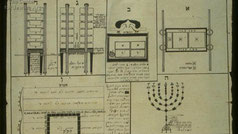
1880. Shevile ha-Arez. Tabernacle Sanctuary Implements (detail of the menorah). Two full page text illustrations depicting within 14 compartments the plans of the Tabernacle, Solomon's Temple, Ezekiel's Temple, the sanctuary implements and Solomon's palace. Origin: Russia, Kursk. National Library of Israel Ms. Heb. 8°211. Photograph Copyright: Center for Jewish Art. Source: Link1, Link2

1880s. Brown’s Self-Interpreting Family Bible. Browns Self-Interpreting Family Bible, containing the Old and New Testaments, to which are annexed marginal references and illustrations, an exact summary of the several books, a paraphrase of the most obscure or important parts, explanatory notes, evangelical reflections, &., &., by the late Rev. John Brown, Minister of the Gospel at Haddington, with many additional references and numerous illustrations. Source: Link

1880 (ca.). A Jewish 9-K Gold menorah/star of David pendant with rubies/seed pearls which opens for scroll, there is one round faceted ed ruby and six rubies as well as six seed pearls. The charm opens from the middle and seperates in the middle. The pendant is stamped 9 ct. Dimensions: 1.63x1x0.38 in; 4x3x1cm. Source: Link

1883. Color lithograph by Friedrich Hottenroth with 35 illustrations. F. Hottenroth born on February 6, 1840 in Johannisberg, died May 26, 1917 in Frankfurt am Main, was a German costume and habitation researcher, lithographer, painter and author. Sheet size: 20 x 28 cm - Lithograph: 16.5 x 24 cm. Source: Link1, Link2

1883-84 (5644). Title: "Sēfer Menôrat ham-mā'ôr : we-ze maʿaśē ham-menôrā ʿim 7 nērôt ... ʿim haʿtāqā li-lšôn aškenaz... / ḥibbērô ... Yiṣḥāq Abôhab." Language: Hebrew, Jiddisch. Univ.-Bibliothek Frankfurt/Main. Source: Link

1886. Zechariah's 5th Vision: Menorah and two olive trees (Zechariah 4). Wood engraving. Gettyimages. Source: Link
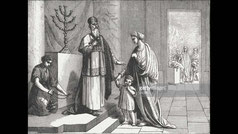
1886. Hannah Dedicates Samuel to the Lord (1 Samuel 1). A Menora in the background. Wood engraving. Gettyimages. Source: Link

1887-1888. The Menorah Monthly Journal, Victorian Age B'nai B'rith. Lot of 2 softcover journals, published by Benjamin F. Peixotto in the United States, written in English. Item size is about 9 ½ by 6 ¼. Volume III, Number 4, October 1887, with about 140 pages + advertisements. Volume IV, Number 1, January 1888, with about 90 pages + advertisements. Source: Link1, Link2, Link3
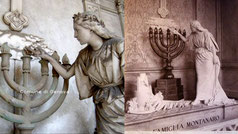
1888. Tomb monument of the family Monataro ("Tomba Montanaro"), Staglieno Cemetery in Genoa (Génova), made by Giovanni Battista Villa (1832-1899). Please see the information and links to the original sources on the website with Menorahs of the 20th century.

1888. German book with Bible images. Title: "Neue künstliche Figuren biblischer Historien" by Johann Fischart (1546-1590) and Tobias Stimmer (1539-1584). This illustration indicates the 22 almond blossoms described in the Bible (Structure of the menorah). Publisher München: Knorr und Hirth. Archive.org. Source: Link

19th century (end). French Liebig card. Liebig pictures are collector's pictures attached to the product packs of Liebig's meat extract. The extract was invented by Justus von Liebig, a German 19th-century organic chemist. His view was that meat juices, as well as the fibres, contained much important nutritional value and that these were lost by boiling or cooking in unenclosed vessels. Source: Link1, Link2, Link3
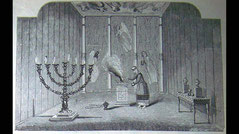
1890. The Holy Place. Illustration of the 1890 Holman Bible. The golden lampstand menorah (7 candles), the cencer with incense (middle), and the table with shewbread (right). Source: Link

1890. Illustration of the 1890 Holman Bible. The Table of Shew-Bread, Ark, and Golden Candlestick of the Biblical Tabernacle. Pictured are religious items of the ancient Hebrews, used in the Sinai Tabernacle and later at the Jerusalem Temple. Shown are the table of shewbread (showbread), the Ark of the Covenant, the golden candlestick (menorah) made of solid gold, the altar of incense, the altar of burnt offering, and the laver (water basin for ritual purification). Source: Link1, Link2, Link3

Late 19th, early 20th century. A school plate in color with the image of a group of people in a room. A man with a crown is on a raise. In front of him is a man in a white with green tunic. He makes an explanatory gesture with his hands. Candles in the Menorah (seven-armed candlestick) are burning in the background. It is an image of the Bible story in which King Belshazzar feasts and in which Daniel has to explain to him the script on the wall (Daniel 5:1-30). Signature: Innes Fripp. Link1, Link2

Late 19th century, early 20th century. Samuel Dedicated by Hannah at the Temple by Frank William Warwick Topham (1838–1924). Francis William Warwick Topham was born in London in 1838. He began studying art at an early age with his father, Francis W. Topham (1808-1877), one of England’s outstanding watercolor artists of the nineteenth century. He then studied at the Royal Academy Schools and at the Atelier Gleyre in Paris. He lived and painted in both Italy and France. Source: Link1, Link2

Mizrah. Artist/Maker: Laiber (?). Place Made: Central Europe. Medium: Color print on paper. Dimensions: 12 1/2 × 16 1/4 in. (31 3/4 × 41 1/4 cm). Source: Link

19th-20th century. Menorah and horns of plenty. Menorah in the center of the image. Artist unidentified. United States. Late nineteenth or early twentieth century. Paint on cut paper. 22/14x 191/2. Free Library of Philadelphia, Rare Book Department. Exhibition "Gilded Lions and Jeweled Horses: The Synagogue to the Carousel" in New York (American Folk Art Museum). Source: Link1, Link2

19th century. 1st picture: Mizrah. Artist/Maker: Israel Dov Rosenbaum. Place Made: Podkamen, Ukraine. Date: 1877. Medium: Paint, ink, and graphite on cut-out paper. Dimensions: 30 1/2 × 21 in. (77.5 × 53.3 cm). 2nd picture: Memorial Calendar, Shiviti, and Mizrah. Artist/Maker: Hayyim Benjamin Blum; Mordecai Abraham. Place Made: Poland. Medium: Paint, pencil, and collage on cut-out paper. Size: 21 7/8 × 21 3/4 in. (55.6 × 55.2 cm). Source: Link1, Link2, Link3
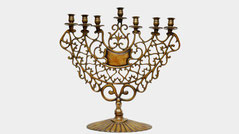
19th century. Bronze Synagogue Menorah from Poland, circa 1850. Dimensions: H 19.75 in. x W 19.75 in. x D 6.75 in. H 50.17 cm x W 50.17 cm x D 17.15 cm. Source: Link

19th century. Large menorah with decorations of lions and a star of David. Marked (on the bottom of one leg): "Made in Austria". The menorah has a round, graded base placed on a square and stylized support with four short legs. Above the base is a round disc decorated with circles and triangles, above which is a flattened ball shape. Two branches rise from the ball, connected by a Star-of-David-shaped decoration; two lions facing each other, their tongues extended. Height: 63 cm. Width: 56 cm. Link

ca. 1890. Majestic antique synagogue Hanukkah menorah, made in Poland with intricate scrolled branches supporting a 7 candle cups atop drip pans. The stem is banded/engraved to a knob decorated base attachment, which is assembled with hand turned threads. The Menorah measures 22"-inches high x 17 1/2"-inches wide x 6 1/2"-inches deep (56x44x17 cm). The solid brass Menorah has a rich colored patina, the base has a hand-cut nut supporting the center stem. Source: Link

19th century. Adjustable Brass Church Altar Menorah from Ireland. Meaasure: 23 inches x 20, candle stand when fully extended 19. Source: Link

19th century. Sephardic menorah in bronze from Spain. The illustrated example uses candles instead of oil. Source: Link

19th century. Seven-armed candlestick menorah of the Jewish liturgy. Brass colors with optional wax candle insert or electric candle use. Size: H: 59.5 cm; W: 46.0 cm. Storage / Location: Stadtgeschichtliches Museum Leipzig, Germany. Europeana. Source: Link

19th-20th century. Hanukkah Lamp. Place Made: Western Europe, possibly Germany. Medium: Copper alloy: cast and parcel-gilt. Dimensions: 9 1/2 × 8 15/16 × 4 3/16 in. (24.1 × 22.7 × 10.7 cm). The Jewish Museum. Source: Link

19th century. Hanukkah Lamp. Maker: Jan Pogorzelski. Bio: active before 1851-c.1910; Warsaw (Poland). Date: 1893. Medium: Silver: repoussé, traced, engraved, punched, and cast. Dimensions: 26 3/4 × 18 × 8 1/4 in. (67.9 × 45.7 × 21 cm). The firm of Jan Pogorzelski was one of several Warsaw silversmiths producing this type of lamp with grape clusters and leaves entwined around the arms. The earliest examples, by Michael Swinarksi and Pogorzelski, date to the 1850s and 1860s. Source: Link

19th century. A Continental large bronze Hanukkah menorah, reel-form base, baluster stem, six scroll branches dot-numbered, prickets and drip pans, flower finial, alterations to branches. Size: height 21 1/4 in. (54cm). Sothebys. Source: Link

1891. An unusual Polish silver Hanukkah lamp with music movement, Antoni Reidel, Warsaw. Of typical form with festooned gallery mounted with chained posts, two topped by leaping deer, the center with eagle and orb, baluster lamps in front of two palm trees topped by pairs of birds, the back plate chased with border of scrolls and flowers, centered by an applied menorah flanked by maces supporting lions, the base fitted with music movement with front panel chased to match. Invaluable, Lot 65. Link

1891. The Parur synagogue in India was rebuilt in 1620, probably on an earlier synagogue. The dedication plaque attached to its external wall indicate that it was built by David son of Jacob Castiel, a descendent of the Spanish expelled Jews. The original Torah ark was replaced in 1891, with a Zechariah's Menorah. Source: Link

1893. The Chicago Cultural Center, Preston Bradley Hall, seven-branched candelabrum (menorah detail). Built 1893; architectural firm Shepley, Rutan and Coolidge; photographed 2011. Chicago, IL., USA / © Sylvie Allouche / Bridgeman Images. IMAGE number SYL616898. Source: Link

19th-20th century. Notre-Dame de la Garde, basilica, a Catholic basilica in Marseille, France. Consecrated on 5 June 1864, the Neo-Byzantine church was built on the foundations of an ancient fort at the highest natural point in Marseille, on the south side of the Old Port of Marseille. Source: Link

19th century. The synagogue in Saluzzo, a town in the Piermont region of Northern Italy, was established in the 18th century and enlarged in 1832. The baroque synagogue is located on the second floor of Via Deportati Ebrei No. 29 (Via degli Israeiliti), in the former Jewish ghetto. Source: Link1, Link2

19th-20th century. Designed to decorate the sukkah, turning the lamp into a kind of the Tree of Life. Richly decorated menorah all in the curls, swirling leaves of the acanthus, even the legs of the base take root. Emmanuel Laaf. Szeged, Hungary. Con.19-beg.20 cc. Museum of Israel, Jerusalem. Source: Link

19th century. A Qajar tile made for the Hebrew market, Iran. Qajar art refers to the art, architecture, and art-forms of the Qajar dynasty of the late Persian Empire, which lasted from 1781 to 1925. Of square form with the Hebrew word for menorah written in blue below a menorah in the form of a flowering tree, flowering plants either side, painted in pink, green, brown and blue enamel. Size: 9 1/8 x 9 1/4in. (23.2 x 23.5cm.). Christie's, Sale 5094, Lot 320. Source: Link

19th century. Ascolta o israello! (Shema Yisrael) a very large printed leaf with the Parshiya of Shema Yisrael in Italian and Hebrew. Rovigi (Italy). At the center of the leaf a large illustration of Moses' figure holding the Tablets of the Law with the 10 Commandments. A frame with illustrations of the Menorah, Moses with Pharaoh's daughter, Moses before the burning bush, Birkat Cohanim, an additional illustration of Moses descending the mountain and Moses during the parting of the Red Sea. Size: 60x80 cm. Source: Link

1896. Synagogue in Mediaș. Wall paintings, Northern wall, eastern pier, Mediaș (Mediasch, Medgyes), Romania. The eastern pier of the northern/southern wall has a “triptych” of two seven-branched menorot and the tablets of the Law, inscribed נר מצוה ותורה אור (“For the commandment is a lamp; and the law is light,” Prov. 6: 23). Photograph Copyright: Center for Jewish Art. Source: Link

19th century. Italy. This carved and gilded wooden chair belonged to the Synagogue of Pitigliano, which was founded in 1598. The furniture of the synagogue was renewed in the late 19th century, the golden age of the community in this little town. Source: Link

1896-1915. Ex libris Solomon Schechter. Bookplate designed for Solomon Schechter (1847–1915). Design includes a menorah and two hands in the gesture of the priestly benediction centered within a Star of David. Artist: Joseph B. Abrahams. Languages: Hebrew, English. Source: Link

1896. Jewish bas-relief at the Great Mosque of Gaza (now destroyed). The inscription below, in Hebrew and Greek, reads “Hananiah, Son of Jacob”. Source: Archaeological researches in Palestine during the years 1873-1874 (1896), page 392. Source: Link

Late 19th-early 20th century. Oil on Celluloid Moses Ten Commandments Angels Hebrew. Artist unknown. Extremely fine painting showing Moses in central vignette flanked by angels at top. Set above a menorah and two Stars of David. The artist uses gilt paint throughout. Extensively inscribed in Hebrew and possibly signed. Invaluable.com, Lot 388. Source: Link
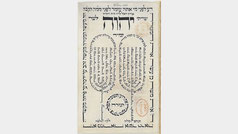
19th century. Bible O.T. Psalm XVI, 8 and LXVII. Shiviti. Language: Hebrew. Parchment mounted on tab. Square writing. Black ink. 173 x 109 mm. The calligraphy of Psalm 67 in the form of seven-branched candlestick (menorah) is traditional in this type of amulet. Bibliothèque nationale de France, Département des manuscrits, Hébreu 1416. Source: Link

Late 19th century. Iraq. Sabbath tablecloth with menorah image. Silk-thread embroidery on cotton. Inscribed in Hebrew on the edge and in the center with a blessing for the well-being and livelihood of the members of the household; the names of spices burned in the Temple are written on the incense altar at the top. The Israel Museum, Jerusalem. Source: Link

19th century. Menorah (Shiviti). Technique: Lithography, watercolor. Dimensions: Height 65.5 cm, Width 50.9 cm. Collection of the Mané-Katz Museum, Haifa. Source: Link

19th century. Shiviti plaque and counting of the Omer. The holly sites. Water colors and handwriting with ink on paper. Artist / Creator: Shneur Zalman. Location: Hebron. Dimensions: Length 53 cm, Width 37.5 cm, Material: Paper. Item Code: ICMS_EIM_MHEJ202. Photographer: Leonid Padrul. Credit: Eretz Israel Museum Collection. Tel Aviv, Israel. Source: Link
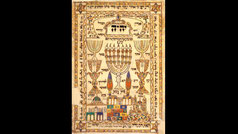
1897. This colorful Shiviti Plaque (completed by Shneur Zalman Mendelowitz) includes, at its base, depictions of the Cave of the Patriarchs in Hebron and Jerusalem's Western Wall. It features a menorah, adorned with a crown bearing the four-letter name of God, the Tetragrammaton. Source: Link

1897. Braz, Iosif (or Osip). Oil on canvas, signed and dated "Braz 1897" at lower right. 25½ x 19 in. (visible), framed to 32½ x 26 in. A young boy practices for his bar mitzvah in front of the rabbi; a menorah with seven candles sits on the table. Iosif Braz was a Russian Jewish realist painter (1873-1936). Goldbergcoins, Sale 76, Lot 388. Source: Link

1898-1904. The Hastings' Dictionary of the Bible was a five-volume Biblical encyclopedia published 1898–1904. The full title was "A Dictionary of the Bible, dealing with the Language, Literature and Contents, including the Biblical Theology." It was edited by James Hastings, with the assistance of John A. Selbie. Article: "Tabernacle" by A. R. S. Kennedy. Source: Link1, Link2, Link3, Link4

1899. Image from the book: Tabernacle Shadows of the "better Sacrifices".: A Helping Hand for the Royal Priesthood by Charles Taze Russell (1852-1916). Russell was co-founder of Watchtower Bible and Tract Society, a religious publishing house, and the subsequent religious community of today's Jehovah's Witnesses (1931). Russell has used several Freemason signs and his menorah does not conform to the biblical guidelines of Exodus 25. Source: Link1, Link2, Link3, Link4, Link5
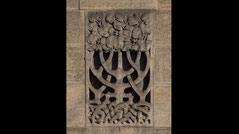
1899-1901. Tree in the form of the menorah (Baum in Form der Menora) by Oskar Alexander Kiefer (1874-1938). Kiefer was a German sculptor from the Baden city of Ettlingen. Among his best known works is the anti-war monument on the town hall tower in Ettlingen. ©Bildarchiv Foto Marburg, Foto: Hajdu, Rose. Source: Link

18??-1923. Torah coronet, Menorah. Istanbul, Turkey. Photo: Radovan, Zev. Center for Jewish Art. Source: Link
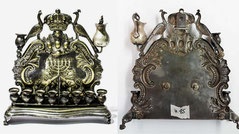
End of the 19th century or the beginning of the 20th century. A Hanukkah menorah, Poland. Copper coated with silver, casted and embossed. Signed by Franget N Plaque. Base looks like a sofa, on it a row of sockets (detachable). The back is decorated like a sea shell, on the top two peacocks and a Tora crown. In the center a applique of a seven stem menorah and two lions on both sides. Dimensions: Height 24 cm, width-22.5 cm. Size: Link

19th century. Two lions Hanukkah lamp with menorah from Poland. Photographer: Radovan, Zev. Photograph Copyright: Center for Jewish Art. Source: Link

19th century (?). Hanukkah lamp, Poland, Kraków. The Hanukah Lamp is made of pewter and consists of eight chairs. The chairs are hollow with a small rod inside the seat for holding a candle. Each chair has four legs. The front of each chair is decorated with a linear depiction of the menorah flanked by two pitchers. The sides and legs are decorated with a pattern of diamonds with dots in the center. The backs of the chairs are in the shape of a conch shell. Museum of the Jagiellonian University. Link
Menorah Pictures from other Centuries:
1st, 2nd, 3rd, 4th, 5th, 6th-10th, 11th-13th, 14th, 15th, 16th, 17th, 18th, 20th, 21st Century
Note: It's nice to see the menorah pictures. However, according to the Bible Jesus (Hebrew Yeshua) is the true meaning behind the Menorah. He is the true and eternal spiritual light: "I am the
light of the world. Whoever follows me will never walk in darkness, but will have the light of life" (John 8:12). The menorah also symbolizes the Tree of Life, because Jesus is the way to
life: "I am the way, and the truth, and the life. No one comes to the Father except through me" (John 14:6). Jesus' Word and the Bible are the light in this world. "Your word is a lamp to my feet and a light to my path" (Ps 119:105 and John
1:1-17).
Copyright info and disclaimer: All content and all photos from ancient and new menorahs provided on this website is for informational purposes only. It is not allowed to publish photos from this website on other websites or printed literature. Please always use only the original sources of the photos. We make no representations as to the accuracy or completeness of any information on this website or found by following any link on this website. We will not be liable for any errors or omissions in this information. We will not be liable for any losses, injuries, or damages from the display or use of this information. We can not guarantee the validity and accuracy of the information, please always check the original source. The opinions expressed from other website owners and those providing comments are theirs alone, and do not reflect the opinions of us.
